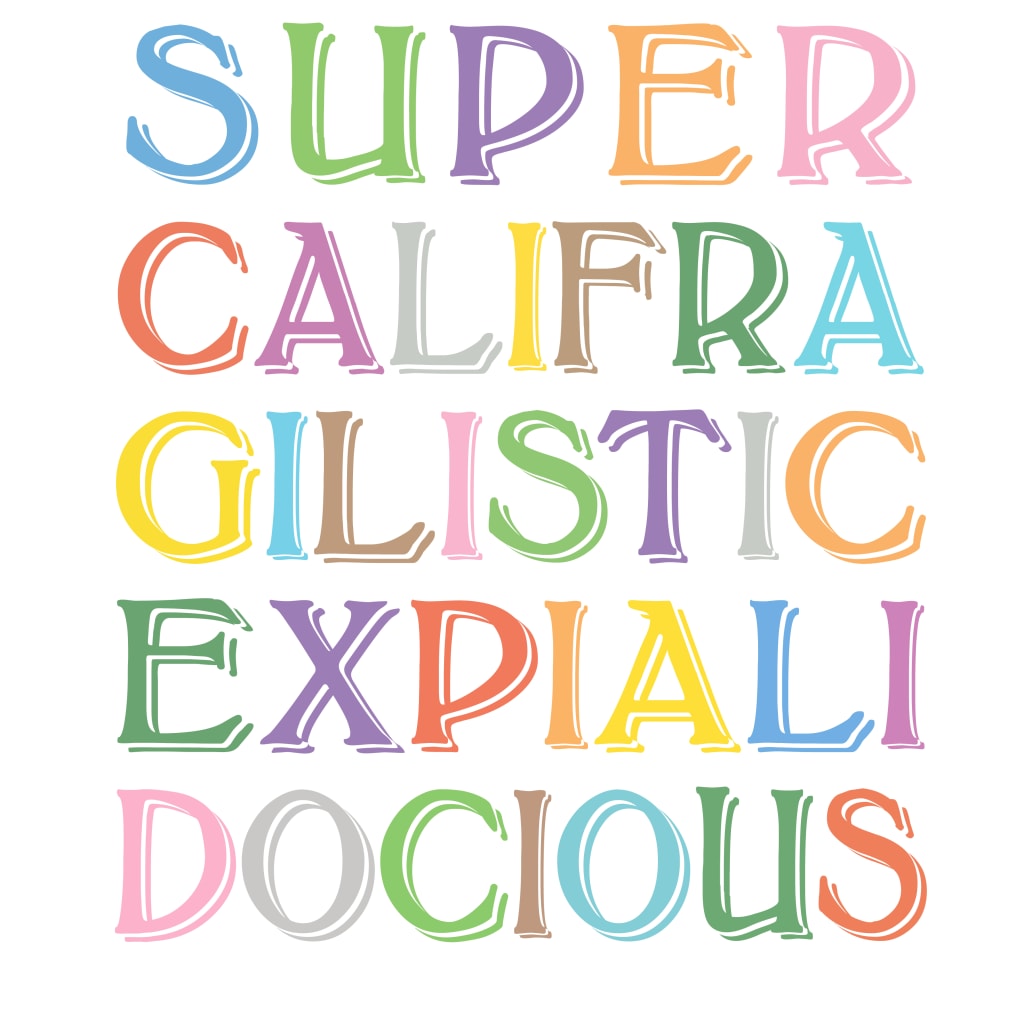Supercalifragilisticexpialidocious is a fantabulous word
It's longer than two syllables, and millions understand the general meaning

Origins
Anyone who has seen the 1964 classic Mary Poppins movie with Julie Andrews and Dick Van Dyke remembers well the word.
Supercalifragilisticexpialidocious
We can pronounce it. Possibly even spell it. As children, we excitedly belted it out endlessly, probably to the unending annoyance of our parents. It became enmeshed in the era’s lexicon. Importantly, we understood its general meaning.
It is a fantabulous word.
Perhaps today’s kids still see the movie and chant it. It may instill an enthusiasm for language discovery beyond AI-generated pablum.
The Wikipedia definition:
The word is a compound word, and said by Richard Lederer in his book Crazy English to be made up of these words: super- "above", cali- "beauty", fragilistic- "delicate", expiali- "to atone", and -docious "educable", with all of these parts combined meaning "Atoning for being educable through delicate beauty."
Probationary Period
New writers to online platforms all undergo a learning curve. During our 60- to 90-day probationary period, we explore and immerse ourselves to whatever degree we choose, reading the work of many writers. We cogitate on our feelings about the site.
For those who survive probation, reflections may become:
Do I want to stick around longer term?
It’s an intriguing place, but not where I wish to spend too much time; bye.
Hmm, I’m not sure; let me stay a while longer before I decide.
Happily, no employer assesses our productivity or gives a tinker’s damn if the company expectations are met. If elementary rules of conduct are followed, we can’t be fired or banned.
Each of us possesses the ecstatic choice to vamoose or hang around. Come and go as our hearts desire. No mom or dad asks questions. No spouse or partner demands explanations.
Those who, for a plethora of reasons, mosey off often never explain why and merely disappear. It’s a place where all are welcome, and no expectations or explanations are necessary.
Inquisitive Folk
In the initial look-see period, the curious ilk, read and read.
For the voracious reading tribe, the site provides a veritable ready-made library, allowing us to meander through the electronic stacks. It’s the equivalent of a shopaholic fix cruising a 24/7, eight-story megamall.
We surf for intriguing articles about subjects that educate, entertain, or enlighten. At some point, we gleefully discover those “must-read” writers we adore. Others we follow for a time but become bored by repetitive content.
Readers, Writers, or Both
Many come only to read. Some write but rarely read. Most do both. I fall within the latter group.
In my newbie phase, I'm always a prodigious reader. A lifelong student of the inquisitive group, my reading scans a broad spectrum.
Writing Advice
Interested in improving the craft of thinking via scribbling words, one genre researched has been the “how to improve your writing” tutorials, articles, and ‘my story’ pieces. In my typical study mode, I’ve devour a plethora. Both on the platform and elsewhere.
From regular folks. From experienced professional writers. From writing coaches. From respected journalists. From snake oil salespersons. From online authorities.
My skill level may improve; hope springs eternal. Some recommendations, though, I cannot abide by and will never follow.
Big Words
Over and over, “experts” counsel not to use big words.
Standard advice is to write at a fourth-grader’s comprehension level. Whether this was the prevailing counsel before the election of a recent USA president with that vocabulary level, I know not.
Never an elementary school educator, I’m unsure what fourth-grade comprehension is anyhow. And, I’ve assiduously avoided listening to a word uttered by said former president.
My favorite instruction, though, suggests that words incorporating more than two syllables make our readers feel stupid and not want to read our writing.
Grammarly seems to agree. Isn’t it fascinating how this magical tool exists to improve writers’ skills?
A few greats, to name but a few — Shakespeare, Tolstoy, Conrad, Hemingway (he’s so noteworthy, they named another ‘must-use’ writing tool after him), Twain, Thoreau, and Solzhenitsyn — managed to chug along, spewing forth rather memorable prose sans electronic assistance.
Whose writing do you so desperately admire you can’t put it down? Or reread over and over? Or make you green with envy, wishing for a fraction of their gift for constructing sentences or evoking emotion?
My guess is that a few of them may use big words.
When Did Dumbing Down Become Fashionable?
Isn’t vocabulary a critical component of learning, education, and growth?
Once upon a time, we valued education as a worthwhile objective — just cuz! Not cuz it might help us make lotsa dough — but cuz our immigrant ancestors understood and appreciated it was the ticket to better, fulfilling, well-rounded lives.
Education included adding new words to our vocabulary. We memorized vocabulary lists. We practiced pronunciation. We recited the meanings. We participated in spelling bee and reading contests. It was thrilling to learn and feel smarter.
Children are curious creatures who love to learn. Let’s not deprive them of the magic of education, learning, and growing. And, yes, of understanding “big words.”
If my words aren’t sufficiently simplistic and readers move elsewhere, I’m not offended. In today’s world drowning in content, sufficient material exists for everyone to digest.
I subscribe to the philosophy articulated in a recent piece by a gifted wordsmith in one article. The gist of the woman’s affirmation was: I ain’t dumbing down my writing so only fourth graders can understand it.
And, I shall continue reading the accomplished writers whose vocabulary propels me to a dictionary.
Thanks to all who are not dumbing down your writing to the lowest common denominator. We need you to push us, keep our brains fresh, and challenge our complacency.
If you’re unfamiliar with the movie, here’s the song.
Your time is valuable. Thanks for spending it here.
Victoria
© Victoria Kjos. All Rights Reserved. 2024.
About the Creator
Victoria Kjos
I love thinking. I respect thinking. I respect thinkers. Writing, for me, is thinking on paper. I shall think here. My meanderings as a vagabond, seeker, and lifelong student. I'm deeply honored if you choose to read any of those thoughts.






Comments
There are no comments for this story
Be the first to respond and start the conversation.